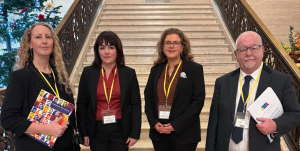Anti-poverty groups called on MLAs to support an Assembly debate on Tuesday which ‘raised the alarm’ about the high rates of child poverty in Northern Ireland.
Almost a quarter of children live in relative poverty with one in five living in absolute poverty, according to Northern Ireland Statistics and Research Agency.
The motion, tabled by SDLP leader Matthew O’Toole, was critical of the Executive’s draft Anti-Poverty Strategy, which has previously been called ‘not fit for purpose’ by a coalition of 95 community organisations, charities and trade unions and others led by the Northern Ireland Anti-Poverty Network.
Problems identified with the draft strategy include no specific targets for reducing poverty levels, little evidence that people with lived experience of poverty were involved in its development, and a lack of new interventions in the form of costed measures that will make a material difference to people in poverty.
In a recent publication the NI Commissioner for Children and Young People also advised that the draft strategy is not suitable for addressing child poverty as it doesn’t take a ‘lifecycle’ approach and doesn’t allocate the resources needed to lift children out of poverty.
The motion proposed that the Executive should support the creation of a new child payment, more support for childcare and expand free school meals. These are all proposals that anti-poverty groups have been championing for some time, highlighting that the support available in Northern Ireland is much lower than elsewhere in the UK.
Dr. Ciara Fitzpatrick from Ulster University supports the introduction of a child payment: “Child poverty has risen sharply in Northern Ireland over the past five years, indicating the toll that both the Covid-19 pandemic and the ongoing Cost-of-Living Crisis is having on the lives of disadvantaged communities.
“Without targeted investment that will seek to reduce child poverty, the future is bleak. Child poverty leads to poorer educational outcomes, poorer health and are more likely to continue to live in poverty as adults.
“We urgently require the introduction of a child payment to ensure that all of our children have the opportunity to thrive. The NI Executive can longer ignore this moral imperative.”
Charities and anti-poverty campaigners, including Trussell, have highlighted that families are struggling with the growing cost of the school day, from school dinners, to uniforms, to transport, and school activities.
Amie Gallagher, from the Focus Project in Derry, notes that the UK Government has expanded free school meals in England to all children whose families receive Universal Credit: “The UK Government is investing £410million per year in providing free school meals to more low-income families.
“We need to see a commitment to do the same from the Northern Ireland Executive. Last year’s public consultation on free school meals showed that people overwhelmingly support expanding free school meals but the Education Minister rejected the proposal due to lack of funds.
“Evidence shows that access to a free, nutritious school meal helps households manage the cost of living and improves children’s health and learning outcomes. Despite this, many children living in poverty here are not eligible under the current system.”
Anti-poverty organisations say they are pleased to see the spotlight on poverty at the Assembly and are calling on all MLAs to participate in the debate and continue to press the Executive for an effective plan to eradicate poverty.



